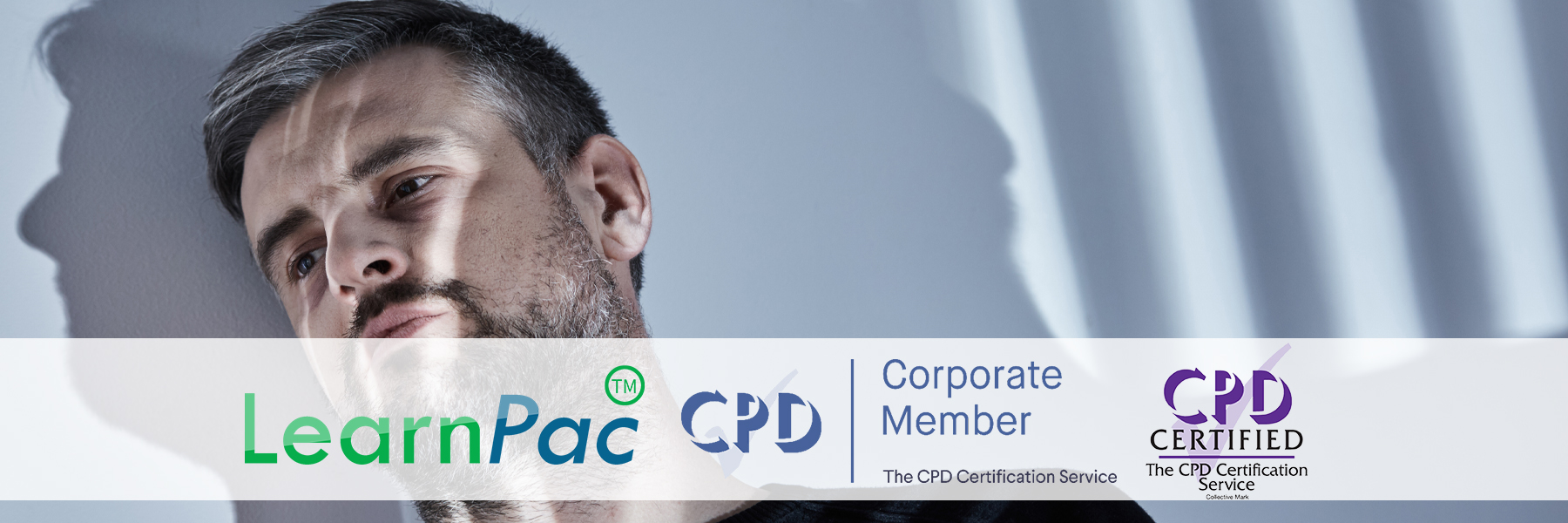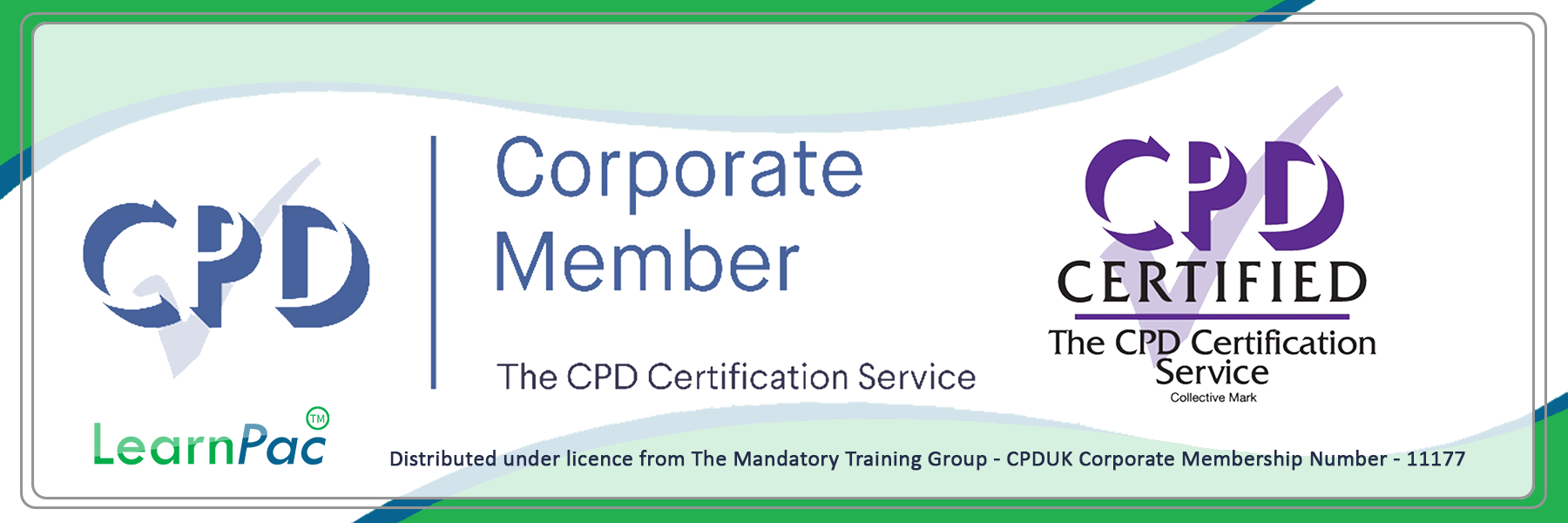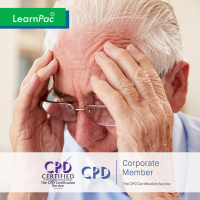Dual Diagnosis Training - E-Learning Courses - CPDUK Accredited

Dual Diagnosis Training – E-Learning Courses with Certificates – CPDUK Accredited.
LearnPac Systems is the leading UK provider of accredited statutory and mandatory training courses for all sectors, including health and social care, education, local government, private and charity sectors.
Dual diagnose training e-learning courses aims to provide information on how drugs, alcohol and mental health issues interrelate and how to work effectively with this client group.
Our dual diagnosis eLearning courses support in developing dual diagnosis treatment methods that work to address both substance abuse disorders and mental health disorders.
Browse our Dual Diagnosis Training - E-Learning Courses
Dual Diagnosis Training E-Learning Courses: Frequently Asked Questions and Answers
Dual Diagnosis Training – E-Learning Courses with Certificates – CPDUK Accredited – LearnPac Systems UK.
Here at LearnPac Systems, we receive many questions about dual diagnosis. We have provided answers to the most frequently asked questions about dual diagnosis.
Click on the text below to see the answers to the Frequently Ask Questions about Dual Diagnosis.
Dual diagnosis is the condition of suffering from a mental illness and a comorbid substance abuse problem. There is considerable debate surrounding the appropriateness of using a single category for a heterogeneous group of individuals with complex needs and problems.
LearnPac Systems is the leading UK provider of accredited statutory and mandatory training courses for all sectors, including health and social care, education, local government, private and charity sectors.
Click here for Dual Diagnosis Awareness – Online Training Course – CPDUK Accredited
Dual diagnosis is a term used to describe a person who is diagnosed with a mental illness and substance use or abuse disorder at the same time. The term comorbidity describes two or more disorders occurring in the same person. They can occur at the same time or one after the other.
Dual diagnosis, also referred to as co-occurring disorders, is a term for when someone experiences a mental illness and a substance use disorder simultaneously.
The reasons for comorbidity are complex. Furthermore, comorbidity is often associated with poor treatment outcome, severe illness course, and high service utilisation. This presents a significant challenge concerning the identification, prevention and management of people with comorbid disorders.
Cognitive behavioural therapy (CBT) is helpful for dual diagnosis patients. CBT is a psychotherapy program that has many benefits for both mental illness and the treatment of drug abuse and addiction.
LearnPac Systems is the leading UK provider of accredited statutory and mandatory training courses for all sectors, including health and social care, education, local government, private and charity sectors.
Click here for Dementia Awareness – Online Training Course – CPDUK Accredited
The dual diagnosis treatment process may include:
- Assessment of psychiatric health
- Integration of addiction rehab
- Treatment for the mind, body and spirit
- Behavioural modification therapy
- Relapse prevention education.
LearnPac Systems is the leading UK provider of accredited statutory and mandatory training courses for all sectors, including health and social care, education, local government, private and charity sectors.
Click here for Mental Health, Dementia and Learning Disabilities – Online Course
Dual diagnosis, also called co-occurring disorders, COD, or dual pathology, is the condition of suffering from a mental illness and a comorbid substance abuse problem.
At the end of this dual diagnosis eLearning course, learners are required to complete an online assessment. On successful completion of the course assessment (80% pass mark), learners will be able to download a FREE CPD certificate that is valid for one year.
These dual diagnosis courses and training cover the following topics:
- Understanding the chemistry of drugs
- Identifying warning signs and triggers
- Understanding diagnosis, treatment and medication
- The danger of mixing drugs
- Fighting addiction
- Exploring schizophrenia and paranoia
- The different types of cannabis
- The side effects of stimulant drugs
- Hangovers, withdrawals and comedowns
- Raising overdose awareness
- Identifying ecstasy psychosis
- Managing drug use
- The risk of injecting
- How to deal with an emergency
- Homelessness, arrest and compulsory detention.
These online dual diagnosis courses and training should be completed by those who work in mental health and social care services, including:
- NHS medical, nursing, AHP and care staff
- Locum doctors and nurses
- Locum allied health professionals (AHPs)
- Agency nurses
- Agency workers
- Healthcare assistants
- Support workers
- Care assistants
- Community services.
Medications are useful for treating mental illnesses. Certain medications can also help people experiencing substance use disorders ease withdrawal symptoms during the detoxification process and promote recovery. Dealing with a dual diagnosis can feel challenging and isolating.
Many people diagnosed with a substance use disorder (SUD) also suffer from co-occurring mental health or behavioural disorder. It is known as a dual diagnosis. Individuals with a dual diagnosis require an integrated treatment plan that addresses both disorders as interconnected mental health issues.
The vital difference between dual diagnosis and co-occurring disorders is the nature of the diagnosis. For dual diagnosis, while the ailments discovered could be caused by substance abuse, they are two (or more) completely separate diagnosis. Contrast that with co-occurring disorders, where mental illness led an individual to self-medicate with drugs and alcohol or the devastating effects and brain damage that comes with addiction led to the development of mental illness. The mental health disorder and addiction are inexorably linked and must be treated together.
A substance use disorder (SUD), also known as a drug use disorder, a medical condition in which the use of one or more substances leads to clinically significant impairment or distress.
Examples of dual diagnosis might include:
- A mental health problem or disorder leading to or associated with problematic alcohol and/or other drug use
- A substance use disorder leading to or associated with a mental diagnosis
- Alcohol and/or other drug misuse worsening or altering the course of a person’s mental illness.
Dual Recovery Anonymous is a 12-step self-help programme that is based on the principles of Twelve Steps and the experiences of men and women in recovery with a dual diagnosis.
Dual diagnosis treatment is a relative innovation in the field of addiction recovery. People experiencing symptoms of a mental health disorder such as anxiety, depressive episodes, delusional behaviour or mood swings are treated separately from those who need help for drug or alcohol abuse.
In the 21st century, dual diagnosis recovery incorporates the most successful aspects of mental health care and substance abuse treatment.
Young people with dual diagnosis are particularly at risk of experiencing poor outcomes. The age, stage of physical, neurological, psychological and social development makes young people more vulnerable. Dual diagnosis presents specific challenges for Aboriginal people who experience high rates of substance misuse.
Yes, specific characteristics may contribute to the simultaneous development of both substance abuse and a psychological disorder. These include:
- Genetics
- Personality
- Brain chemistry.
A person suffering from both substance abuse and mental health problems is likely to feel distressed by their disorders which may lead to poor emotional health.
People with comorbid disorders have an increased risk of depressed feelings, anxiety, and suicidal behaviour. The particular mental disorder and specific substance being abused will also have specific emotional effects.
Yes, treatment for a dual diagnosis can present several challenges. Some of these are as follows:
- Comorbid disorders tend to be more chronic than one disorder alone.
- Dual diagnoses have a more severe course of development.
- People with a dual diagnosis are often exposed to additional environmental risk factors.
- Medication options are limited because the potential for abuse is higher.
LearnPac Systems is the leading UK provider of accredited statutory and mandatory training courses for all sectors, including health and social care, education, local government, private and charity sectors.
On successful completion of each of the dual diagnosis courses modules, you will be able to download, save and/or print a quality assured continuing professional development (CPD) certificate. Our CPD certificates are recognised internationally and can be used to provide evidence for compliance and audit.
The CPD Certification Service (CPDUK) accredits all of our statutory and mandatory training courses as conforming to universally accepted Continuous Professional Development (CPD) guidelines.
LearnPac Systems is distributed under the licence from The Mandatory Training Group – CPDUK Corporate Memebrship Number – 1117.





